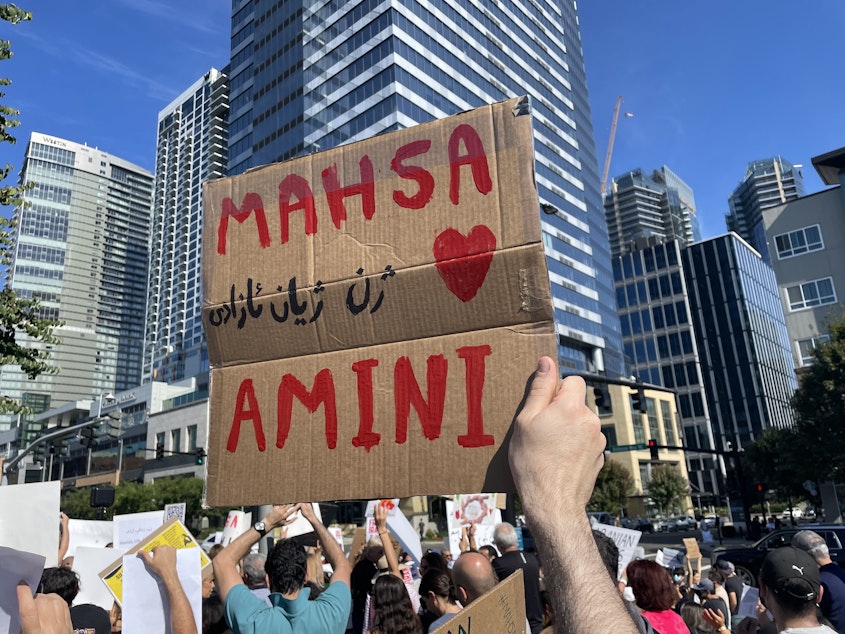'This is for all of us.' Hundreds gather in Bellevue to protest death of Mahsa Amini

On Sunday, hundreds of protestors gathered in Bellevue to demand justice for Mahsa Amini.
The 22-year woman died in Iranian police custody earlier this month
Mahsa Amini was arrested for wearing her hijab, or headscarf, too loosely. Improper hijab is a crime in Iran. Officials claim she later suffered heart failure while in the custody of Iran’s “morality police.” Her family and supporters say she was beaten in a police van.
Amini’s story has sparked protests in cities across Iran and inspired messages of solidarity from Iranians around the globe – including here in the Pacific Northwest.
"It's really hard, especially now that I have a little girl I want to take back to Iran one day, but I'm terrified," said Aran, a protester. "Every time I've been to Iran, I've been arrested because of so-called dress code as well. It's terrifying and we don't deserve that."
Another protestor, named Aba, said, "this goes beyond Massa. This is for all of us. This is for my country and for all the women and all the members of the LGBTQ community. Everyone who was fighting to just live a decent life."
Protesters interviewed by Soundside only provided their first names, citing concerns about retaliation against their families by the Iranian government.
The Iranian government has arrested hundreds of protesters and journalists since demonstrations began, and dozens of demonstrators have been killed.
Alex Vatanka is the founding director of the Iran program with the Washington, D.C. based Middle East Institute. He said that in Iran, it seems people have had enough.
"Only about 15% of Iranian public believes you should ask women to put on the veil. So you've got a clear majority of society that does not accept this," Vatanka said. " And they're not, as I said, out there in the streets protesting against this one issue. But the reality is, the list of grievances against Islamic Republic is long."
That list of grievances includes both domestic and foreign policy, and the long standing rule of Iran's Supreme Leader, Ali Khamenei. He's been in power since 1989.
Internet has been blocked by the government throughout much of the country, but Vatanka said there are still ways to get reliable information from inside the nation.
"This is not North Korea or another very isolated country. This is a country with a large diaspora — 5 to 8 million Iranians around the world," he said. "Most of them have family members still back in Iran, they'll find ways to get in touch. The information is coming out. It will be impossible in this day and age to sort of stop the flow of information."
The Biden Administration has expressed solidarity with the Iranian people. Vatanka noted there's been discussion of the U.S. helping Iranians find ways to continue accessing the internet. But further involvement by the U.S. is stymied by ongoing negotiations around Iran's nuclear program.
Vatanka said that work on a nuclear deal shouldn't stop America from supporting the human rights of Iranian citizens. And that reaching a deal won't necessarily solve the US' relationship with Iran.
Instead, Vatanka suggests the Biden administration should focus on ways to empower the Iranian people.
"That's always been the biggest tool in the toolbox for the United States — angry Iranians' public sentiment against their own regime. How can you help them in their own country? Because if they come to power, if there is no Islamic Republic at some point in the near future, then we wouldn't really have discussion about Iran's nuclear program."
Vatanka said he doesn't expect that the nation will hear directly from Khamenei until after protests have died down.
Here in Washington state, local Iranians are standing in support of their family and friends back home.
Nilufar, a protester, lives in Bellevue. She said she left Iran 12 years ago, after participating in the massive Green Movement protests in 2009 following the presidential election.
"I'm here to raise my voice so that the entire world will hear us, and they can be with us like we are with Ukraine and other countries. We are human too."
Nilufar is one of the approximately 7,000 Iranian immigrants living in the Seattle, Tacoma, and Bellevue metro areas.
Being in a diaspora can be a lonely experience for some.
Nedar, another protestor, talked about the isolating feeling of watching the Iranian protests from her life in the U.S., where few of her coworkers or friends even know what’s going on.
"Nobody at my job knows what's happening. Maybe they've seen one or two headlines, but they don't know the gravity of the situation. It's hard to have this level of emotional experience — watching my friends and family and my brothers and sisters in Iran, to be going through this intense experience. And for me to be here in the safety of the U.S., and also feel connected and disconnected at the same time."

